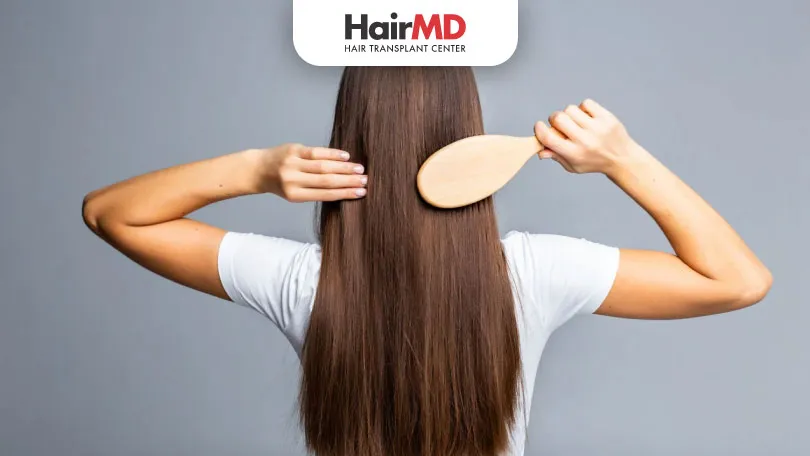24th Dec, 2022

Hair loss, whether in straight or curly hair, has become a widespread issue. In the past, it mainly affected middle-aged individuals, but today even people in their 20s are experiencing hair fall, baldness, and thinning hair. This growing concern affects people of all ages, and there are multiple reasons behind it.
To address this, it’s essential to explore the causes, treatments, and prevention methods for hair loss in straight hair. Understanding these factors can help manage the problem and potentially slow down the progression of hair loss.
What’s covered in the article?
- Causes of Hair Loss in Straight Hair
- Treatment for Hair Loss in Straight Hair
- Prevention Methods for Hair Loss in Straight Hair
- Conclusion
Causes of Hair Loss in Straight Hair
Losing around 50 to 100 hair every day is normal for everyone. The hair regrows and such a trivial loss of hair usually goes unnoticed. But things become serious when new hair doesn’t replace the lost one. Some reasons for it could include the following.
Hormonal Changes
Hormonal changes during pregnancy, menopause, or problems like thyroid can lead to temporary or permanent hair loss in many individuals.
Heredity
This is the most common cause of hair loss in straight hair. It is termed androgenic alopecia, female-pattern baldness, and male-pattern baldness. It usually takes place gradually in predictable patterns. For instance, it could be seen through a receding hairline and bald spots in men and thinning hair along the scalp’s crown or hair partition in women.
Stress and Traumatic Events
Routine and prolonged stress leads to overthinking, which can affect normal hair growth in the long run. Besides, stress resulting from traumatic events involving physical or emotional shock can also cause hair loss. Such hair loss is temporary, though.
Excessive Hairstyling
Many people keep trying or changing hairstyles frequently. Those pulling the hair tight like cornrows or pigtails can lead to hair loss called traction alopecia.
In addition, people undergoing hot-oil treatment also are likely to lose hair. The occurrence of scarring following inflammation can lead to permanent hair loss.
Treatment for Hair Loss in Straight Hair
Advancements in dermatology have helped emerge many treatment options for hair loss. The type of treatment depends on the dermatologist’s diagnosis and treatment based on the underlying condition. Some potential options for treatment for hair loss in straight hair may include but aren’t limited to the following.
Minoxidil: Products with minoxidil help many people regrow their hair or slow down the rate of hair loss. It can take around five to six months to prevent further hair loss and to regrow hair. Besides, it may take a few more months to know if the treatment works for an individual.
Hair Transplant: In most permanent hair loss cases, only the top of the scalp gets affected. For such cases, a hair transplant can prove effective. The treatment takes time, and the results show up in phases over 9 to 12 months.
Clinical Treatment: Some other clinical treatment options may include low level laser therapy, platelet rich plasma (PRP) therapy, which helps enhance hair density.
Prevention Methods for Hair Loss in Straight Hair
Preventing hair loss is always a more prudent thing to do than treating it. Accordingly, some preventive measures include the following.
- Comb and deal with your hair gently. Avoid hard rubbing or combing.
- Quit smoking if you do, as smoking and baldness in men have a close linkage.
- Refrain from using hot rollers, hot-oil treatments, or curling irons.
- Cover your hair to protect it from sunlight.
- Consult a dermatologist to know if medications are causing hair loss.
- Use a dermatologist-recommended shampoo, hair oil, and conditioner.
We hope this blog helped you to some extent in understanding hair loss in straight hair. Consider consulting us for a more specific and personalized hair loss treatment for your straight hair. Our dermatologists will diagnose and prescribe the best-suited treatment while answering all your hair questions about hair loss in your case.
Do You Know?
Nearly 250 Patients Visit HairMD
Everyday For Various Hair Concerns?
(Your journey to healthier and fuller hair starts here!)
Meet Our Dermatologists
Conclusion
In conclusion, hair loss in straight hair can be caused by various factors, including hormonal changes, heredity, stress, and excessive hairstyling. With advancements in dermatology, treatments like minoxidil, hair transplants, and PRP therapy offer effective solutions.
However, prevention is always better than cure—gentle hair care, avoiding harmful styling practices, and consulting a dermatologist for proper guidance can help manage and reduce hair loss. If you’re struggling with hair loss, visit HairMD for expert advice and personalized treatment options tailored to your needs.
Further Reading
How Much Hair Loss is Normal for Teenage Male?
Understand normal hair loss in teenage males and when it may signal an issue. Visit HairMD Pune for expert advice on teenage hair health and treatment options.
Is Hair Loss One of the Side Effects of Using Glucosamine?
Explore potential risks & benefits of this supplement for joint health. Get the facts on hair loss & glucosamine use.
Top Kitchen Ingredients to Boost Hair Growth
Discover the best kitchen ingredients for hair growth! Use coconut oil, onion juice, aloe vera & more to nourish your hair naturally and reduce hair fall.
How to use Minoxidil and Dermaroller together?
Boost hair growth with Minoxidil & Dermaroller! Learn the right technique, benefits, and mistakes to avoid for thicker, healthier hair.
Have thoughts? Please let us know
We are committed not only to treating you, but also educating you.











